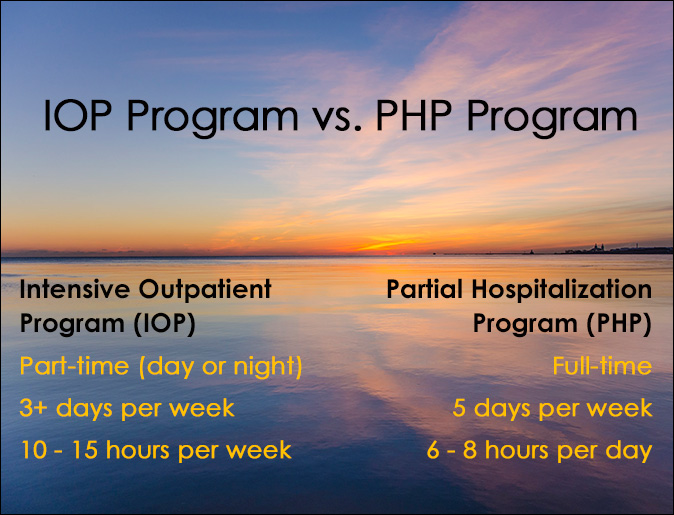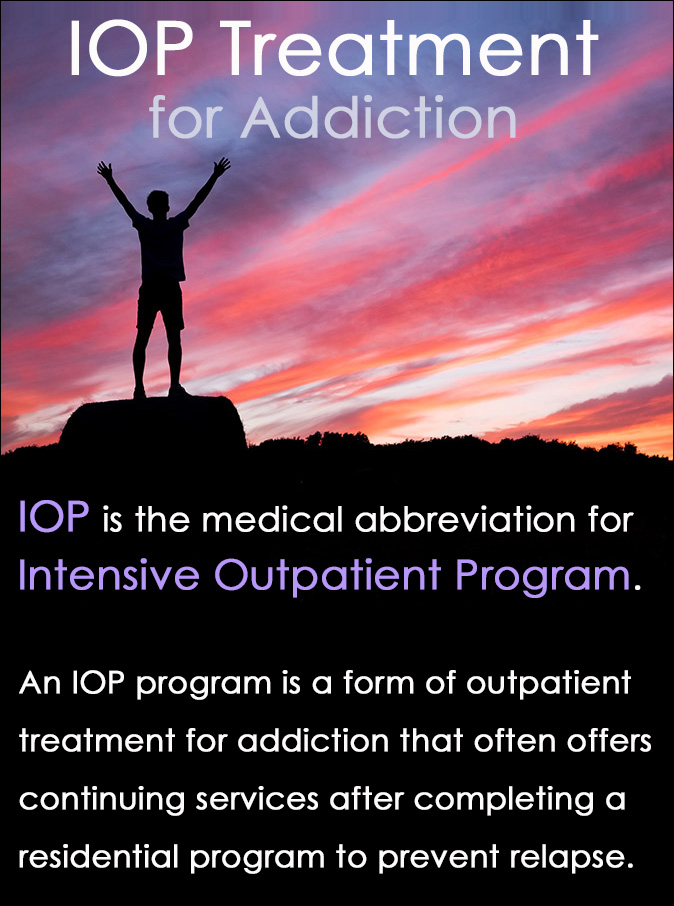
A PHP Program and IOP Treatment are two of the most effective ways for people seeking treatment for substance use addiction and mental health issues to continue recovery and prevent a relapse.
There are several levels of care for substance use addiction and mental health treatment. These include full-time residential inpatient services and outpatient services like a PHP Program or IOP Treatment.
An inpatient program is usually a minimum of 30 days and can extend longer than that in a residential treatment facility.
Outpatient programs such as a Partial Hospitalization Program (PHP) or an Intensive Outpatient Program (IOP) offer the highest level of care, but with more flexibility than an inpatient program.
What is the Difference Between a PHP Program and IOP Treatment?
Outpatient addiction treatment is an excellent way for people to continue receiving services after completing a formal inpatient addiction program. It can also be helpful for those who don’t require residential treatment.
The two main forms of outpatient treatment include a Partial Hospitalization Program (PHP) and an Intensive Outpatient Program (IOP).
Both PHP and IOP are carried out during the day, or possibly at night, while living outside of an inpatient treatment facility, although sometimes patients may stay at a residential facility.
These differ from full-time residential programs where all clients must remain in the facility for the duration of their treatment and receive services around the clock, seven days a week.
IOP and PHP treatment usually offer the same services and therapies as inpatient programs, although the days and hours are reduced. They also do not include drug and alcohol detox, which must be done in a residential facility.
Key Differences Between PHP vs IOP
PHP Treatment – Partial Hospitalization Program
- Full-time
- 5 days per week
- 6 to 8 hours per day
IOP Treatment – Intensive Outpatient Program
- Part-time (day or evening)
- 3+ days per week
- 10 to 15 hours per week
These are the most common hours and days for many PHP and IOP programs, although there may be some variations depending on the treatment facility.

What is a Partial Hospitalization Program – PHP Program?
PHP is the medical abbreviation for Partial Hospitalization Program.
This is an outpatient treatment program for people with substance use addiction or dual diagnosis mental health issues.
This type of outpatient program is designed for those who wish to maintain a functional level of life, while benefiting from full-time care, without the need to stay at a residential facility.
Many people in a PHP program are free to go home or to a sober living facility at the end of the day, although some programs also offer residential housing for their clients.
A PHP outpatient program is often used as a viable option to full hospitalization, or residing at a residential treatment center.
PHP treatment can be used to transition from inpatient to outpatient care and is useful for maintaining a continuation of services and preventing relapse in early recovery.
For example, a PHP program is an ideal solution for an individual who has completed a residential treatment program for drug or alcohol addiction but still requires additional services.
While a patient may have come a long way, he or she understands there is still more work to do.
The decision as to whether a patient should be placed in a PHP program is at the discretion of his or her doctor and treatment staff.
The treatment team will consider the severity of the patient’s illness, history, environment, and support system.
What Happens in a Partial Hospitalization Program?
A partial hospitalization program (PHP) provides a full day of treatment, usually for 6 to 8 hours per day.
It’s a full-time option that allows patients to live on their own when they are not taking part in therapy sessions, and qualified professionals monitor their progress and stability throughout the day.
However at night or when not in therapy sessions, a suitable support network must be in place to ensure the patient’s health and safety.
A PHP treatment program usually involves a wide range of therapies, including one-on-one sessions, group sessions, and family counseling if necessary.
Group sessions may also include recreational activities such as hiking, vocational skills groups, or equine therapy.
The exact modes of care are always unique depending on the individual needs of each client.

What is IOP Treatment?
IOP is the medical abbreviation for Intensive Outpatient Program, and while similar, it offers even more flexibility than a PHP program.
An IOP Treatment program offers a structured mode of care with the goal of overcoming substance use addiction and preventing relapse.
The level of care required for each person is assessed on a case-by-case basis.
IOP treatment takes into consideration each individual’s home and work life while providing the most effective level of outpatient care.
There are a number of ways IOP programs can be managed, and each facility may offer different variations.
At Oro House Recovery Centers, we have structured our IOP treatment schedules so that individuals can continue work and attend therapy sessions when it works best for them, often in the evening and on one weekend day.
We’ve found that a lot of the meaningful work gets done in IOP once patients have been in recovery for a few months and are ready to tackle the deeper-rooted issues that led to their addiction.
How Many Hours is an IOP Program?
An IOP program takes place on days and times that best suit the goals and needs of each client. IOP treatment times vary, but can usually fit around other commitments.
An IOP program is generally around 10 to 15 hours per week. That could be made up of several evening sessions along with additional time on the weekend.
The length of duration for an IOP program also varies from person to person depending on the individual requirements of each client.
IOP vs PHP Similarities
There are many similarities between IOP vs PHP, as they are both focused on preventing relapse and providing a healthy recovery for each person.
IOP and PHP treatment are more cost effective than full-time residential inpatient programs.
Outpatient programs are excellent ways to keep patients sober, prevent relapse, and ensure a successful recovery.
While PHP therapy is a full time program, IOP therapy is part time and ideally suited as addiction treatment for professionals, or those who require a minimal amount of maintenance.
IOP and PHP treatment both offer customized plans to suit the individual needs of each person.
Individualized Treatment Model
At Oro House, we believe in a goal-oriented recovery that doesn’t end with residential care. We provide long-term treatment plans that offer a bridge back to a sober life for our clients.
For that reason the modes of treatment are tailor-made and individualized for each client. We provide a wide range of evidence-based therapies in our non 12 step recovery program that best fit the needs of our clients in both inpatient and outpatient settings.
Many treatment centers only offer residential services.
But we continue to support and work with our clients after they complete the inpatient phase of recovery and transition to outpatient addiction treatment such as a PHP Program or IOP Treatment.
Related Posts
- Cocaine Withdrawal Symptoms, Treatment and Detox
Giving up a stimulant substance like cocaine has a complex psychological effect on the recovering…
- High-Functioning Anxiety Symptoms and Treatment
Anxiety disorders are the most common form of mental illness in the United States. They…
- Wet Brain Syndrome Symptoms and Alcoholism Risks
Wet Brain Syndrome, also known as Wernicke-Korsakoff Syndrome (WKS), is a severe condition that occurs…
